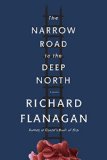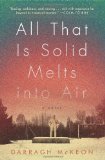Summary | Excerpt | Reviews | Beyond the book | Read-Alikes | Genres & Themes | Author Bio

It is no secret that Russia is not a country for wordsmiths who speak truth to power. In 2006 Anna Politkovskaya, a journalist and human rights activist known for her vocal opposition to President Putin, was a victim of an untraced contract killing. With Oblivion, written in 2011, Sergei Lebedev unearths a past Russia has worked hard to erase or, at least, whitewash, and by exposing these veins of horror, the young writer now belongs in an eclectic camp that includes the great Aleksandr Solzhenitsyn and in contemporary times, the intrepid journalist and gay rights activist Masha Gessen.
Lebedev's rich and searing story explores how the oppressive weight of history, especially one that is not acknowledged, can smother the life out of an individual. The unnamed narrator of Oblivion grows up under the guardianship of a mysterious old man he refers to, simply, as Grandfather II. This man is an outsider to the narrator's family, merely a neighbor, but he served small but necessary functions on the periphery, helping with gardening and generally acting as wise counsel. The narrator's ties to Grandfather II are forged even more strongly when he receives a blood transfusion from him. Oblivion picks up when the narrator is a young adult reflecting on his childhood and wondering who, exactly, this towering presence in his life, now deceased, was. Nobody at the dacha knew much about Grandfather II but the village folk recognized rot when they saw it. Grandfather II had the stench, the narrator remembers, of "official boots."
The plot thickens when the narrator inherits the old man's meager possessions after his death but they do nothing to stanch the curiosity: "The real horror was in the useless keys, the saucers from beat-up tea sets, in worn coins - in the anonymity of existence, in the impossibility of learning anything morally from these remains," he remarks, "which could have been caught in an archaeologist's sieve, about a person who seemed to blend into the general background of an era." His goal now comes into sharp focus: travel to the distant Russian taiga to a town indicated in a few letters Grandfather II possessed and unearth this old man's past.
The pilgrimage or quest is a powerful metaphor here and the closure the narrator hopes to achieve at the end of it all turns out to be a disturbing one. As the reader travels along, eventually reaching the uranium mines tucked away in the Russian hinterland (see Beyond the Book), the old man's past, which one gets clues about early on, clicks slowly into place. The big reveal here lies not just in his horrific crimes, but in the sheer brazenness of their anonymity. The world, Lebedev reminds us, did not notice and therein lies the even greater horror.
This is a novel that demands measured reading, not simply because of the weight of its ideas but also due to its languorous pace. The sheer poetry of its prose is enough to keep you hooked though. The blinding snow, the monotone color, Lebedev (ably translated by Antonina W.Bouis) brings a painter's brush to the canvas rendering an arresting work of art:
The gray bread of my childhood, the loaves of bread on the bakery counters, people lining up an hour before opening, the line darker than twilight; women in gray scarves, men in gray coats, faces gray with lack of sleep, and the gray salted urban snow; I understood where that bread had come from...where that ubiquitous gray came from - not in a belittling sense but grayness as the absence of color or as the color of dust.
A geologist by training, Lebedev brings this perspective to the prose by accurately delivering grandeur of scale, a mission especially important when talking about the vast Russian hinterland, where roads exist only in the winter when the swamps freeze and places are so remote they seem turned into "storehouses of time, cut off from the country's overall life." You can feel the vastness of the tundra in your bones – this enormity coupled with the crushing weight of history delivers a one-two gut punch that efficiently sets the stage for the moving story about the Russian gulag where millions died in service to a grander cause. Despite the feral harshness of the landscape and the horrors the narrator discovers, the novel is surprisingly subtle. Lebedev works with a fine scalpel letting his message — that it is vital for history to be recognized and validated without slipping into oblivion — seep into our bones insidiously.
The wrenching catharsis delivered by Oblivion is the realization that people carry on despite their collective checkered past. They are the ones who "huddle in the ruins, unable to take them apart completely and build something different; they have grown accustomed to disarray, to accepting crevices in the old walls as living space; to the fact that you can live without looking back at the past and assuming that the shade of ancient walls is convenient shade on a hot day and nothing more." Do they have a choice but to carry on? Not really. But in a novel this melancholic, even these measured doses of hope are welcome rays of sunshine.
![]() This review
first ran in the January 20, 2016
issue of BookBrowse Recommends.
This review
first ran in the January 20, 2016
issue of BookBrowse Recommends.

If you liked Oblivion, try these:

The Narrow Road to the Deep North
by Richard Flanagan
Published 2015
Moving deftly from a Japanese POW camp to contemporary Australia, this savagely beautiful novel tells a story of love, death, and family, exploring the many forms of good and evil, war and truth, guilt and transcendence.

All That Is Solid Melts into Air
by Darragh McKeon
Published 2014
A gripping end-of-empire novel charting the collapse of the Soviet Union through the focalpoint of the Chernobyl disaster.
Your guide toexceptional books
BookBrowse seeks out and recommends the best in contemporary fiction and nonfiction—books that not only engage and entertain but also deepen our understanding of ourselves and the world around us.